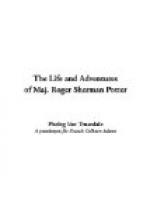“Dispensing all ceremony, I invited mine host to a conference in one corner, and then and there pleaded the lean condition of my purse, to which he listened with great patience, and when I had done begged me to consider him a friend. Once indeed he seemed on the point of shedding tears of sorrow for my troubles; but his eyes resumed their usual dryness. On the following day, his sympathy having no doubt run out, he informed me, with great politeness of manner, that the demand for his lodgings was more than equal to the supply. ‘Perhaps,’ he added, ’you can make it convenient to continue your journey.’
“I was in the condition of an army unable to move for want of supplies. It was no difficult matter to make a dozen or so of political speeches, or to make a meeting split its sides with laughter, or to tear the sophistries of an opponent into tatters, but to be cheated out of one’s money in a great city, and leave the Astor to enter the Irving, or the more fashionable ‘New York,’ with an empty pocket, though common among New Yorkers, was a feat I had not learned to achieve.”
The mischief of the matter was, that no sooner had I got rid of General Fopp, than a man, whom I shall for convenience sake call the great Captain Splinters, made my acquaintance. This man, of whom many queer things were said over tea-tables, by people calling themselves the aristocracy, plumed himself on being the greatest politician Manhattan Island ever was blessed with. People of steady habits differed in their views on this subject, some asserting that the honor of the island would sustain no loss if he were made Governor of New Jersey, or President of the Camden and Amboy Railroad, in which latter capacity he would have ample means of gratifying his ambition for mutilating legal voters. I had heard of this man through the newspapers; he seemed, however, a much smaller man than they had represented him to be. In fine, he told me the newspapers had always taken great pride in misrepresenting him; but he said so many good things of himself, and recounted the many scrapes he had been in with such evident self-satisfaction, that I began to mistrust there was something in him. It was at least certain that he had hung himself to the government, in the very harmless belief that it could not get along without him. Of his pranks, as related by himself, I had no very high opinion, inasmuch as they made public virtue cut a very sorry figure. He, however, requested me to bear in mind the fact, that he never squared his opinions with those who set so high a value upon public virtue that they were for ever nursing it and weeping over it at their firesides.
“He thought the nation extremely fortunate in possessing an individual capable of rendering it services so varied as he was capable of. He made power his game, and to the end of extending universal liberty to vagabonds, he had at his command the services of no less than four hundred and forty as arrant knaves as ever did bloodletting at elections, or managed the rascality necessary to the success of their candidate. They had given up the business of stealing; and being much in need of money and clean raiment, had taken to the more profitable occupation of president-making, hoping ere long to be rewarded by a grateful government with important and lucrative appointments.




